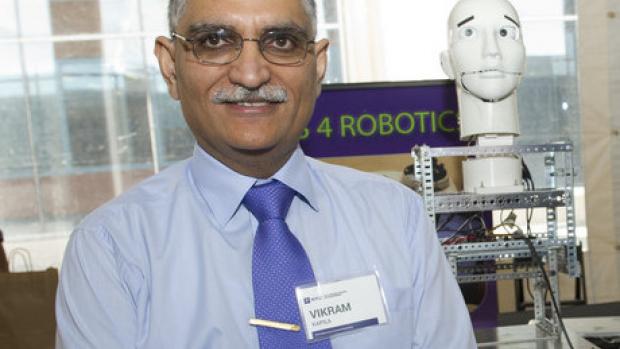On the Frontier
Professor Kapila selected to join education leaders at national symposium

The annual National Academy of Engineering (NAE) Frontiers of Engineering Education (FOEE) Symposium brings together the field’s most innovative and inspiring figures, allowing them to share insights, collaborate, and network.
Tapped to attend after a rigorous nomination, application, and selection process based on the cutting-edge nature and potential impact of their work, participants are expected to return to their institutions ready to implement new ideas and effect change.
Professor of Mechanical and Aerospace Engineering Vikram Kapila will be among the select group of educators at the 2016 FOEE, to be held in late September.
"The goal of the Frontiers of Engineering Education program is to strengthen US innovation by nurturing and catalyzing the insights of education leaders on today’s 21st century engineering education needs,” said NAE President C. D. Mote, Jr. “The program builds this community of engaged engineering educators as a resource committed to the preparation of engineering students for today’s engineering world.”
“With today’s unprecedented pace of technological advances and the significant challenges the world faces, engineering education plays a crucial role. But it must reinvent itself in order to produce a larger and more diverse engineering workforce highly capable of innovation and value creation for society,” said Nadine Aubry, University Distinguished Professor and Dean of the College of Engineering at Northeastern University and Chair of the FOEE Advisory Committee. “The Frontiers of Engineering Education symposium provides a forum for creative engineering educators to generate novel approaches, share early implementation schemes, establish a national network, and serve as change agents in their home institutions.”
Kapila, the recipient of numerous school and university-wide teaching awards, is widely recognized for his contributions to K-12 STEM education — thanks in large part to his efforts, both individually and with NYU colleagues, the School of Engineering is now considered a major force in that area, in New York City and beyond — and for developing Tandon’s Mechatronics Lab. “I am deliberately developing synergies in education, research, training, mentoring, and outreach within the interdisciplinary fields of mechatronics and robotics,” he explains. “Mechatronics and robotics can spark students’ intellectual curiosity, engage their interest in hands-on learning, modernize engineering curricula and make it relevant to students’ interest, and address workforce demands for graduates with interdisciplinary training.”
Teaching awards and invitations to high-profile symposia aside, Kapila finds it most gratifying to see that his innovations are producing measurable benefits at multiple levels. “The K-12 students who participate in programs here at Tandon learn engineering content and acquire laboratory skills to engage in open-ended projects,” he says. “We’ve created and sustained an ecosystem of K-12 programs that exploit students’ fascination with modern technologies as a hook to stimulate them to learn science, technology, engineering, and math subjects while concurrently broadening the training of university-level engineering students through mentoring roles and providing K-12 teachers with challenging professional development opportunities and curriculum help.” Even the general public benefits from this synergy, he asserts, thanks to an annual expo he helps mount that showcases the most fascinating and important research done at the school.
His ultimate goal: to see young people transformed from mere consumers of technology to creators of technology that can be used in service to society, and at FOEE, he’ll be with others who share that same goal.




